The Crawling Eye
War of the Worlds
The Day The Earth Stood Still
The Thing From Another World
Invasion of the Body Snatchers
Earth VS. the Flying Saucers
Teenagers From Outer Space
I Married A Monster From Outer Space
The Beast From 20,000 Fathoms
The Incredible Shrinking Man
The Blob
Invaders From Mars
Forbidden Planet
It! The Terror From Beyond Space
The Monster That Challenged the World
When Worlds Collide
Attack of the 50 Ft. Woman
The Amazing Colossal Man
Them!
This Island Earth
Creature From the Black Lagoon
The World, the Flesh, and the Devil
Rocketship XM
Destination Moon
20,000 Leagues Under the Sea
20 Million Miles to Earth
The Giant Behemoth
The Fly
The Time Machine
The Angry Red Planet
The Man From Planet X
Flight to Mars
The Wasp Woman
Journey to the Center of the Earth
Invisible Invaders
The Magnetic Monster
Terror From the Year 5000
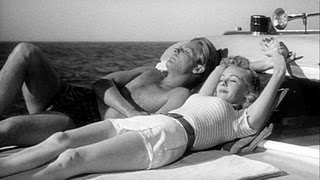 The Incredible Shrinking Man
The Incredible Shrinking Man
Release Date: April 1, 1957
Cast: Grant Williams as Scott Carey
Randy Stuart as Louise Carey
April Kent as Clarice
Billy Curtis as midget
Paul Langton as Charlie Carey
Raymond Bailey as Dr. Thomas Silver
Screenplay: Richard Matheson, Richard Alan Simmons
Music: Irving Getz, Hans J. Salter, Herman Stein
Cinematography: Ellis W. Carter
Distributed By: Universal Studios
Length: BW- 81 minutes
Budget: $750,000
Production Dates: May 20, 1956 to Mid-July, 1956 Director: Jack Arnold
Interesting Tidbits
In 2009, the Library of Congress placed The Incredible Shrinking Man in the National Film Registry. It was said to be "culturally, historically or aesthetically" significant. In 1958 it won the Hugo award for that year's best science fiction or fantasy dramatic presentation.
Director Jack Arnold was responsible for three earlier low budget sci-fic movies. These "B" movies were It Came From Outer Space (1953), Creature From the Black Lagoon (1954), and Tarantula (1955.)
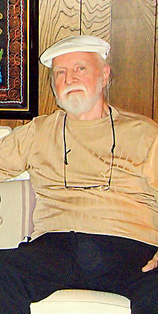 The Incredible Shrinking Man is based on Richard Matheson's (Photo: right) novel The Shrinking Man. He also did the screenplay working with Richard Simmons.
The Incredible Shrinking Man is based on Richard Matheson's (Photo: right) novel The Shrinking Man. He also did the screenplay working with Richard Simmons.
Matheson worked primarily in the horror, fantasy, and science fiction genre. One of his novels, I Am Legend, was filmed under three different titles: The Last Man On Earth (1964), The Omega Man (1971), and I Am Legend (2007.) The latter starred Will Smith.
Richard Matheson wrote 14 Twilight Zone episodes including Nightmare At 20,000 Feet. He also penned the Star Trek episode The Enemy Within, released on October 6, 1966.
Raymond Bailey who played Dr. Silver gained fame as the banker Mr. Drysdale on the popular sitcom The Beverly Hillbillies in the early '60s.
A lot of thought went into the illusion of the shrinking of Scott, and his relationship to his environment. The special effects crew worked tirelessly on the photography. During the seven weeks of pre-production, the set was barred to all non-essential personnel.
The Plot
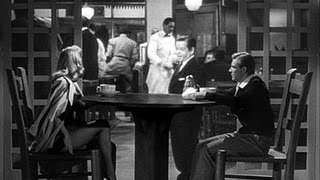 Scott Carey (Grant Williams), is a businessman who is on vacation on a boat, off the Californian coast, with his 5ft 8in wife Louise, when he suddenly is contaminated by a radioactive cloud. At the time, Louise was below deck getting refreshments, so she wasn't affected. Subsequently, Scott, who is 6ft 2in tall and weighs 190 pounds, thinks little of the cloud, and doesn't appear to have been affected by it.
Scott Carey (Grant Williams), is a businessman who is on vacation on a boat, off the Californian coast, with his 5ft 8in wife Louise, when he suddenly is contaminated by a radioactive cloud. At the time, Louise was below deck getting refreshments, so she wasn't affected. Subsequently, Scott, who is 6ft 2in tall and weighs 190 pounds, thinks little of the cloud, and doesn't appear to have been affected by it.
However, one morning, six months later, Scott notices that his shirt seems too big. He blames it on the cleaners. However, this trend continues, and Scott believes he is shrinking. At first Louise dismisses his fears as silly, but he continues to lose weight and height. Noticeably, this is shown when he looks his wife, previously six inches shorter than he, in the eye.
Scott visits a prominent research laboratory, and after numerous tests, learns that exposure to the radioactive mist and some normal pesticides, caused his cells to shrink.
Scott continues to both shrink and lose weight. His story hits the headlines, and he becomes a national curiosity. He also has to give up his job and stops driving. To make ends meet, he sells his story to the national press.
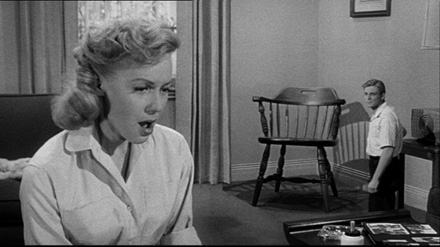 By this point he feels humiliated, and expresses his shame and impotence by lashing out at his wife. She is reduced to tears of despair at her husband's fate.
By this point he feels humiliated, and expresses his shame and impotence by lashing out at his wife. She is reduced to tears of despair at her husband's fate.
Then, it seems, an antidote is found for Scott's affliction: it briefly arrests Carey's shrinking when he is 36 and a half inches tall and weighs 52-pounds. Despite halting his dimunation, he is told that he will never return to his former size, unless a cure is found, and that the antidote will only arrest the shrinking. Still, he seems relatively content to remain at three-feet tall, and begins to accept his fate.
At a circus, he briefly becomes friends with a female dwarf, who initially is identical in height; she is appearing in a side-show and persuades Scott that life isn't all negative being their size. Although their relationship is platonic in the film, it becomes romantic in the novel. During one of Scott's conversations with his new friend, he notices he has become even shorter than she, meaning the antidote is not working.
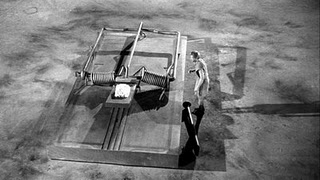 Exasperated, Scott runs away. He continues shrinking, and eventually is reduced to living in a dollhouse. After nearly being killed by his cat, he winds up trapped in a basement and has to battle a voracious spider, his own hunger, and the fear that he may eventually shrink down to nothing.
Exasperated, Scott runs away. He continues shrinking, and eventually is reduced to living in a dollhouse. After nearly being killed by his cat, he winds up trapped in a basement and has to battle a voracious spider, his own hunger, and the fear that he may eventually shrink down to nothing.
After defeating the spider, Scott accepts his fate and (now so small he can escape the basement by walking through a space in a window screen) is resigned to the adventure of seeing what awaits him in even smaller realms. The film's ending monologue implies Scott will eventually shrink to atomic size; but, no matter how small he shrinks, Scott concludes he will still matter in the universe and this thought gives him comfort and ends his fears of the future.
Source: Wikipedia.com.
The Wrap-up
I felt Scott Carey's monologue at the end was soul stirring and reverent. He was continually shrinking to the atomic level. At this point he got closure and accepted his fate because he meant something in the eyes of God.
"... I looked up as if somehow I would grasp the heavens - the universal - world's beyond number. God's silver tapestry spread across the night ... Yes, smaller than the smallest - I meant something too. To God there is no zero. I still exist."
Back in the early '60s, I would scan the TV guide for movies I wanted to watch. One particular day I saw The Incredible Shrinking Man listed. I knew I had to clear my calendar to watch.
Well, back in those days my brothers and I worked with our father. He worked for a dental laboratory and made pickups and deliveries to dentists in different cities, and sometimes went as far as Staten Island, New York.
My father would drive the car (we were then too young to drive) and we would run up and down the stairs making pickups and deliveries.
Unfortunately on the day of the program we returned home too late for me to watch the entire movie. I rushed into the house and immediately turned on the TV set. Grant Williams was delivering his monologue at the end. Needless to say I was very disappointed.
